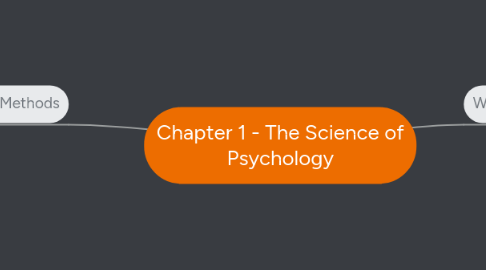
1. What is Psychology?
1.1. Psychology
1.1.1. The scientific study of behavior and mental processes
1.2. Scientific Method
1.2.1. A systematic process used by psychologists for testing hypotheses about behavior
1.3. Theory
1.3.1. An explanation of why and how a behavior occurs
1.4. Pseudopsychology
1.4.1. Conclusions that sound scientific but that haven't been tested scientificly
1.5. Critical Thinking
1.5.1. Thought processes used to evaluate and analyze information and apply it to other situations
2. Goals, Hypotheses, and Methods
2.1. Goals
2.1.1. To describe behavior
2.1.1.1. Observe events and behaviors, then look at how events might be related
2.1.2. To predict behavior
2.1.2.1. Predict what events or behavior may occur, based on their relationship
2.1.3. To explain behavior
2.1.3.1. Suggest and test an explanation in hypothesis
2.1.4. To control or change behavior
2.1.4.1. Create programs or treatments to control or change the behaviors
2.2. Methods
2.2.1. Define and describe the issue to be studied
2.2.2. Form a testable hypothesis
2.2.3. Choose an appropriate research strategy
2.2.4. Conduct the study to test the hypothesis
2.2.5. Analyze the data to support or reject the hypothesis
2.3. Hypotheses
2.3.1. Predictive
2.3.1.1. An educated guess about the relationships among variables
2.3.2. Causal
2.3.2.1. An educated guess about how one variable will influence another variable
2.4. Definitions
2.4.1. Population of interest
2.4.1.1. The entire universe of animals or people that could be studied
2.4.2. Sample
2.4.2.1. The portion of the population of interest that is selected for a study
2.4.3. Naturalistic Observation
2.4.3.1. Observing behavior in the environment in which the behavior typically occurs
2.4.4. Case Study
2.4.4.1. An in-depth observation of one participant
2.4.5. Generalizability
2.4.5.1. How well a researcher's findings apply to other individuals and situations
2.4.6. Survey
2.4.6.1. A research method that asks a large group of people about their attitudes, beliefs, and/or behaviors
2.4.7. Correlation
2.4.7.1. Positive
2.4.7.1.1. A relationship in which increases in one variable correspond to increases in the other variable
2.4.7.2. Negative
2.4.7.2.1. A relationship in which increases in one variable correspond to decreases in the other variable
